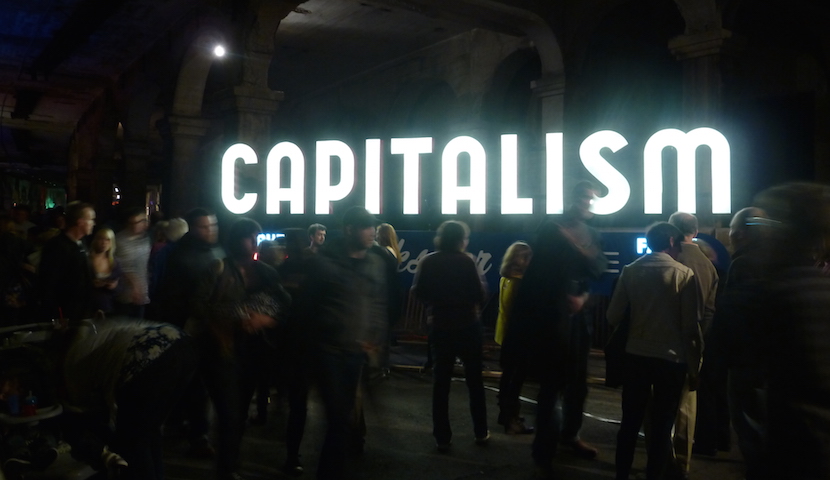JOHANNESBURG — When the Economic Freedom Fighters march to the Johannesburg Stock Exchange, and Bell Pottinger throw White Monopoly Capital around the room, are they both missing the real problem with companies listed on the Johannesburg Stock Exchange. Should they rather be targeting executive renumeration after a Deloitte report revealed that JSE Top 100 company executives earn on average R69,000 a day. Talent must be rewarded but at what cost. Major shareholders are the only ones who have the power to keep executives in check, but that would likely see the haves voting against themselves, which is unlikely to happen. The report shows that about 30 years ago, the ratio of an executive salary to that of a worker was around 50:1, it is now 500:1, where an executive is earning R2 million a month, a worker might be earning R4,000. Well known economist Azar Jammine says this will be the end of Capitalism, not only in South Africa, but around the world. – Stuart Lowman
By Matthew le Cordeur

Cape Town – A Deloitte report that reveals JSE Top 100 company executives earn on average about R69,000 a day points to why capitalism will fail, not only in South Africa, but around the world.
That is the verdict of Azar Jammine, director of economic consultancy Econometrix.
“Awareness is growing by the day in line with growing inequality, which is raising the ire of the working class,” Jammine told Fin24 on Wednesday.
Despite promises of economic development since apartheid ended, South Africa still experiences extremely high levels of inequality, unemployment and poverty. This is seen to a lesser extent around the world.
South Africa is currently in a technical recession and unemployment figures are at a 10-year high. The political mood is tense, with untested corruption allegations against members of the African National Congress distracting the nation from the core task of inclusive economic transformation and growth.
Execs earn on average R17.972m a year
The report by Deloitte’s actuarial, reward and analytics leader Leslie Yuill shows how the average executive of the JSE Top 100 plus companies earn an average of R17.972m a year, or about R69 000 a day.

Executives in companies with a market cap of between R100bn and R1.4trn earn an average of R38.327m a year, the report shows.
Jammine, who believes capitalism is the most effective economic system in the world, is worried about its future.
“Institutions surrounding the capitalist system globally over the past few decades are conducive to growing inequality,” he said. “This will destroy capitalism.
Also read: Do mining execs deserve pay? David Christianson – yes every cent.
“In South Africa, it is that much worse due to the legacy of apartheid,” he explained. “People here tend to think it is a South African problem, but it is what drove Americans to elect Donald Trump.”
Yuill cited this in the report: “As much as this is of deep concern to all South Africans, as is the rate of unemployment, we are not alone in this, as the concern spreads far wider than just South Africa.”
Powder keg of potential dissent and disharmony
Yuill explained the executive pay continues to attract intense media scrutiny both locally and abroad, with headlines on executive pay appearing on a frequent basis.
“Much of the focus this year has been on the growing inequality between those at the top of the organisation and the general workforce.
“The disparity in levels of top executive pay in relation to those of the lower paid workers is a societal concern worldwide,” Yuill said.
Also read: Allan Gray “outraged” at $8m severance payment to Net1 CEO Belamant
“This is particularly the case in South Africa, with its additional transformational needs and high levels of unemployment, which contribute to a powder keg of potential dissent and disharmony.”
Yuill warned that “excessive or undeserved remuneration may undermine the efficiency of the company, affect its reputation and is not aligned with shareholder interests”.
High pay is what lies at the heart of structural problems
Pointing to the latest statistics, Jammine said high pay is what lies at the heart of structural problems.
“That is not very helpful to economic growth,” he said. When the working class see the disparity, it creates an antagonistic industrial environment. The employer class becomes less willing to take on more workers and become more reluctant to employ people.

“They opt for capital intensive processes,” he said.
According to data released by Statistics South Africa on Tuesday, employment declined over the past year by 0.6% or 58,000 jobs. Meanwhile, gross domestic product grew by 0.5% in the same period.
Jammine finds this appalling, because it points to how companies are growing while employment is not.
“Formal sector growth is less than growth in GDP,” he said. “That pattern is repeated all the time. There is huge number of unemployed people.”

